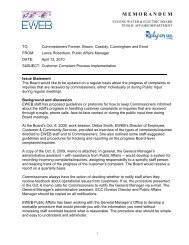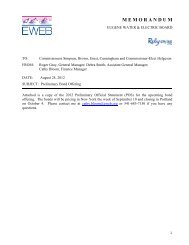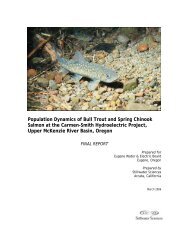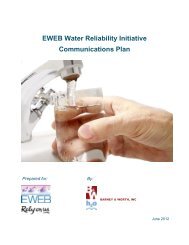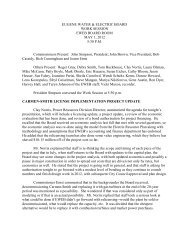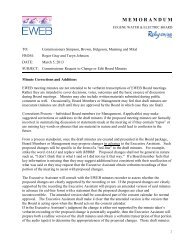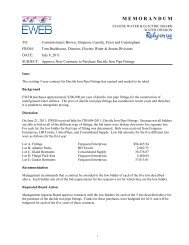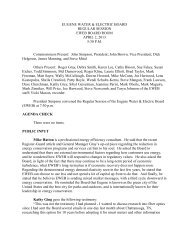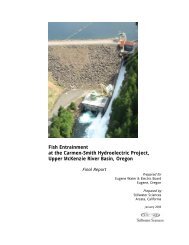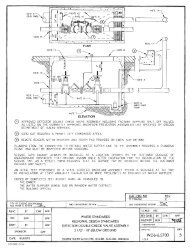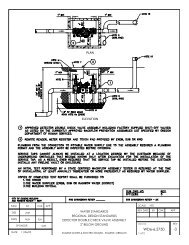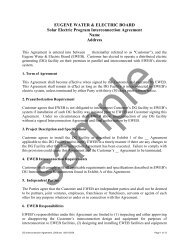Preparing for the NEXT CENTURY - Eugene Water & Electric Board
Preparing for the NEXT CENTURY - Eugene Water & Electric Board
Preparing for the NEXT CENTURY - Eugene Water & Electric Board
Create successful ePaper yourself
Turn your PDF publications into a flip-book with our unique Google optimized e-Paper software.
4 EWEB: PREPARING FOR THE <strong>NEXT</strong> <strong>CENTURY</strong><br />
Utility’s roots traced<br />
to typhoid epidemic<br />
A typhoid epidemic that struck <strong>Eugene</strong><br />
100 years ago provided <strong>the</strong> catalyst that<br />
led to <strong>the</strong> creation of today’s <strong>Eugene</strong> <strong>Water</strong><br />
& <strong>Electric</strong> <strong>Board</strong>. When <strong>the</strong> outbreak<br />
was traced to <strong>the</strong> private, <strong>for</strong>-profit water<br />
company, outraged citizens sprang into<br />
action, voting in 1908 to buy <strong>the</strong> system<br />
and create a municipal, citizen-owned<br />
water utility.<br />
The <strong>Eugene</strong> City Council ordered <strong>the</strong><br />
construction of a hydroelectric power<br />
plant that would run <strong>the</strong> pumps necessary<br />
to ensure adequate water pressure. When<br />
<strong>the</strong> Walterville Hydroelectric Plant on <strong>the</strong><br />
McKenzie River was completed in 1911,<br />
<strong>the</strong> City Council transferred control of <strong>the</strong><br />
utility to a separate citizen board.<br />
But even be<strong>for</strong>e <strong>the</strong> first meeting of <strong>the</strong><br />
<strong>Eugene</strong> <strong>Water</strong> <strong>Board</strong> took place on March<br />
11, 1911, city leaders already were thinking<br />
about more than providing clean, safe water<br />
to <strong>the</strong> citizens of <strong>Eugene</strong>.<br />
The Walterville Power Plant generated<br />
plenty of surplus electricity. First, <strong>the</strong> city<br />
decided to power its streetlights. Then, a<br />
handful of businesses started buying power.<br />
The <strong>Eugene</strong> Planing Mill on Lawrence<br />
Street, currently <strong>the</strong> site of <strong>the</strong> REI store,<br />
became <strong>the</strong> public utility’s first electric<br />
customer. In 1916, <strong>the</strong> board purchased <strong>the</strong><br />
private Oregon Power Company’s electric<br />
system, positioning <strong>the</strong> utility as <strong>the</strong> fullservice<br />
provider it is today.<br />
By 1932, Leaburg Dam and Powerhouse<br />
were completed, providing even more<br />
electricity <strong>for</strong> our growing community.<br />
The electric utility continued to expand<br />
from those early beginnings. The name<br />
of <strong>the</strong> <strong>Eugene</strong> <strong>Water</strong> <strong>Board</strong> was officially<br />
changed to <strong>the</strong> <strong>Eugene</strong> <strong>Water</strong> & <strong>Electric</strong><br />
<strong>Board</strong> in 1949. By that time, EWEB had<br />
constructed <strong>the</strong> steam plant and was<br />
generating electricity from <strong>the</strong> facility.<br />
The plant later provided steam heat to<br />
most of <strong>the</strong> downtown area, a practice that<br />
continues today.<br />
Since EWEB’s beginnings 95 years ago,<br />
its elected commissioners and professional<br />
staff have maintained a strong ethic of<br />
public ownership, a belief that water and<br />
electricity are essential products that<br />
should be owned by <strong>the</strong> people. The words<br />
of <strong>for</strong>mer <strong>Eugene</strong> Mayor Joseph Matlock<br />
hold true today as much as <strong>the</strong>y did nearly<br />
a century ago:<br />
“In my mind, water is associated with<br />
health, light with learning, and it is our aim<br />
that each child, however poor or obscure,<br />
shall have at <strong>the</strong> minimum cost <strong>the</strong>se two<br />
fundamentals of civilization.”<br />
Early city hall, and first <strong>Eugene</strong> <strong>Water</strong> <strong>Board</strong><br />
office.<br />
Building a new fish ladder at Leaburg Dam,<br />
2001.<br />
Leaburg Powerhouse.<br />
“In my mind, water is associated with health, light with learning, and<br />
it is our aim that each child, however poor or obscure, shall have at <strong>the</strong><br />
minimum cost <strong>the</strong>se two fundamentals of civilization.”<br />
– Former <strong>Eugene</strong> Mayor Joseph Matlock, 1908



